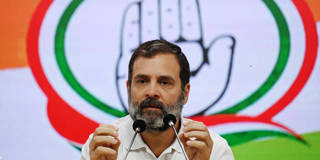The sentencing of Rahul Gandhi, who leads the opposition Indian National Congress, to two years in prison over a 2019 quip may turn out to be a political own-goal by the ruling Bharatiya Janata Party. But the episode's implications for the future of India's democracy should not be underestimated.
NEW DELHI – The sentencing of Rahul Gandhi, the leader of the opposition Indian National Congress, to two years in prison, and his disqualification as a lawmaker in the Lok Sabha (the lower house), has sent shockwaves through India’s political system. Beyond reverberating through both houses of parliament, the episode has opened a new and sorry chapter in India’s political history – and cast serious doubt on the future of its democracy.
Gandhi was targeted over comments he made during a 2019 campaign speech in the southern Indian state of Karnataka. After discussing India’s economic travails, Gandhi named six “thieves” who had contributed to them: Nirav Modi, Mehul Choksi, Vijay Mallya, Lalit Modi, Anil Ambani, and Prime Minister Narendra Modi. “One small question,” Gandhi quipped, “how are the names of all these thieves ‘Modi, Modi, Modi’? Nirav Modi, Lalit Modi, Narendra Modi, and if you search a little more, many more Modis will emerge.”
It is obvious that Gandhi was calling out specific individuals for allegedly looting India’s economy, before delivering an offhand observation that three of them happen to share a surname. You might say that there was no need for Gandhi to comment on their name at all. But politicians, including many from the ruling Bharatiya Janata Party (BJP), have said far worse in election speeches about all sorts of groups – from rival politicians to minorities – with no criminal case brought against them.

NEW DELHI – The sentencing of Rahul Gandhi, the leader of the opposition Indian National Congress, to two years in prison, and his disqualification as a lawmaker in the Lok Sabha (the lower house), has sent shockwaves through India’s political system. Beyond reverberating through both houses of parliament, the episode has opened a new and sorry chapter in India’s political history – and cast serious doubt on the future of its democracy.
Gandhi was targeted over comments he made during a 2019 campaign speech in the southern Indian state of Karnataka. After discussing India’s economic travails, Gandhi named six “thieves” who had contributed to them: Nirav Modi, Mehul Choksi, Vijay Mallya, Lalit Modi, Anil Ambani, and Prime Minister Narendra Modi. “One small question,” Gandhi quipped, “how are the names of all these thieves ‘Modi, Modi, Modi’? Nirav Modi, Lalit Modi, Narendra Modi, and if you search a little more, many more Modis will emerge.”
It is obvious that Gandhi was calling out specific individuals for allegedly looting India’s economy, before delivering an offhand observation that three of them happen to share a surname. You might say that there was no need for Gandhi to comment on their name at all. But politicians, including many from the ruling Bharatiya Janata Party (BJP), have said far worse in election speeches about all sorts of groups – from rival politicians to minorities – with no criminal case brought against them.